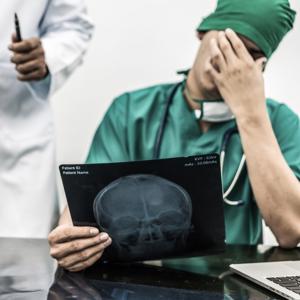Anyone can catch hospital-acquired infections. You can prove medical malpractice liability to receive compensation for your damages. When given proper care and treatment quickly, these infections do not lead to dangerous consequences for the patient. Sepsis and septic shock can occur as a result of an infection that goes untreated or undiagnosed for too long. According to Johns Hopkins patient safety experts, each year more than 250,000 deaths occur due to medical negligence in the USA.
Hospitals and health care workers follow strict protocols for cleanliness and sterility to ensure patients’ safety. The treatment environment should be free from germs. When the hospitals and medical staff fails to provide safe practices causing infection-related harm then you can file a medical malpractice case.
What Is Hospital-Acquired Infection & Georgia Medical Malpractice?
Hospital-acquired infections are those infections that hospital patients get and these infections are not associated with patients’ admitted health issues or diagnoses. Medical malpractice liability can be placed in case you caught these infections and your condition deteriorates.
If an infection occurs 48 hours after being admitted to the hospital then it is likely a hospital-acquired infection. A wide array of bacteria is found in hospitals. If the patients’ immune capacity is diminished, there is a likelihood of getting such infections. Hiring a professional attorney will help you in establishing liability and strengthening your case to attain successful outcomes.
How Can a You Get Infections at a Hospital?
Based on three different risk factors, you can get an infection in a hospital:
-
Patient Risk Factors:
The risk factors for patients include the length of stay in a hospital, the severity of the injury or illness for which the patient was admitted, and the capacity of their immune system during a hospital visit.
-
Hospital Risk Factors:
These factors include the treatment setting and cleanliness of the hospital. The water systems of the hospital need to be cleaned, all the medical devices must be sterilized, the HVAC system should be filtered, the patient beds must be properly sanitized, and the building surface should be clean.
-
Iatrogenic Risk Factors:
These factors involve the care with which hospital staff, nurses, and doctors should perform their duties. This includes care during invasive procedures like intravenous administration of medication, urine catheterization, and intubation. It also includes the appropriate use of antibiotics and how frequently the staff washed hands.
It is extremely challenging to show how the infection was transmitted. If you can prove that it occurred when you were admitted to the hospital then the hospital will be responsible.
Symptoms of Sepsis:
Sepsis resulting from acquired infection causes body-wide inflammation, increased respiratory rate, increased heart rate, increased white blood cell count, and fever. If your infection remains untreated and escalates into sepsis then you can suffer serious injuries. Sepsis can cause severe damage to internal organs, it can even cause death. It is one of the leading causes of death following treatment in ER and ICU.
Hospital Liability for Sepsis or Death:
From a legal perspective, determining liability for the injuries of sepsis and hospital-acquired infection is very challenging. It requires an in-depth investigation of the circumstances in which you acquired the infection. The reasons are analyzed such as why proper treatment was not given and whether it could be prevented.
In hospitals, it is not always clear to determine who is liable for a patient’s infection. If it seems like that a doctor is responsible for the infection then you may not be able to hold the hospital liable as the doctor could be an independent contractor instead of an employee.
A Case for Hospital-Acquired Infection:
You will have to establish the defendant’s liability to bring a successful medical malpractice lawsuit over sepsis or hospital-acquired infections. Often, such cases require the assistance of a qualified medical witness who will examine the treatment situation and determine the liability. A medical witness can identify whether the hospital staff exhibited compliance with the appropriate medical standard of care or not.
If it is concluded that the infection was preventable, and occurred due to the medical professional’s negligence, then you can successfully bring a lawsuit. The following damages can be recovered:
- Lost income
- Current and future medical expenses for treatment of infection
- Pain and suffering
Speak to Experienced Georgia Medical Malpractice Attorneys:
Consult with our experienced Georgia medical malpractice attorneys to know more about your legal options. Your attorney will strengthen your case to attain a successful outcome. We believe in protecting your legal rights and obtaining the maximum compensation that you deserve.






